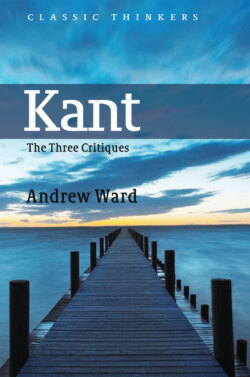Читать книгу Kant - Andrew Ward - Страница 19
The role of mathematics and natural science in Kant’s overall strategy
ОглавлениеWhatever reservations there may be concerning Kant’s claims about the status of the fundamental judgments of mathematics and natural science, it is a central part of his strategy that these judgments – most importantly, those in mathematics – are acknowledged, at the beginning of his critical enquiries, as having genuine synthetic a priori validity. By the time he wrote the second edition of the First Critique,he had self-consciously adopted what he calls ‘the regressive method’ of substantiating his position. That is, he begins with what he regards as two sets of incontestably genuine synthetic a priori judgments – the judgments of pure mathematics and pure natural science – and proceeds to argue back from them to their necessary presuppositions. He had, in fact, given a key place to this regressive procedure, in the first edition, with regard to mathematics. For he makes it clear that what should above all convince his readers of the correctness of his views of space and time is that these views alone can explain our possession of the synthetic a priori judgments of mathematics (see A 46–9/B 63–6).
Of course, the regressive method does not exclude the use of a direct manner of proof, either of space and time or of the pure concepts of the understanding. And to the extent that the direct method is employed in the first edition, it is still to be found in the second. However, given Kant’s own preference for the regressive method of proof for space and time even in the first edition, it would, I submit, be a mistake to deny its importance to his overall strategy. It is true that his famous transcendental deduction of the pure concepts of the understanding does not require the prior acceptance of the first principles of pure natural science: their certainty is employed only as a means of rejecting an empiricist derivation of the ‘pure’ concepts (B 128). But the transcendental deduction does require the prior acceptance of his views on space and time; and these views are, by Kant’s own admission, made ‘completely convincing’ because they alone can explain the synthetic a priori nature of mathematics (A 46/B 63).
But how can the regressive method be of primary importance to Kant when, in the later Critique of Practical Reason, he claims that the First Critique has been able to ‘overthrow’ scepticism with regard to natural science and mathematics (CPractR, 5:53)? There is, in reality, no inconsistency between this claim and the primacy of the regressive method. His point in the Critique of Practical Reason is that once it is recognized that the objects of the senses are mind-dependent (appearances), and not things in themselves, we can explain why scepticism concerning the objective validity of both natural science and mathematics can have no force.The sceptic alleges that no reply to his doubts can be offered; and he would be right, Kant agrees, if the objects of the senses were things in themselves. But, given that these objects are mind-dependent (appearances), we are enabled to overthrow scepticism by showing that both natural science and mathematics must apply to spatio-temporal objects. This attack on scepticism does not contradict Kant’s employment of the regressive method in the First Critique.Far from it: the attack relies on our first accepting the existence of mathematics, as a body of synthetic a priori judgments holding for the structure of space and time, in order to render completely certain the mind-dependence (the ideality) of space and time. Once this has been achieved, Kant is in a position to explain (in the Principles of Pure Understanding) why pure mathematics and natural science must apply to the objects in space and time. It is the explanation of these two disciplines’ objective validity – why they must apply to spatio-temporal objects – that Kant regards as overthrowing scepticism. The regressive method plays a vital initial role in this explanation because, as he sees it, that method can alone render fully convincing the ideal status of space and time.
